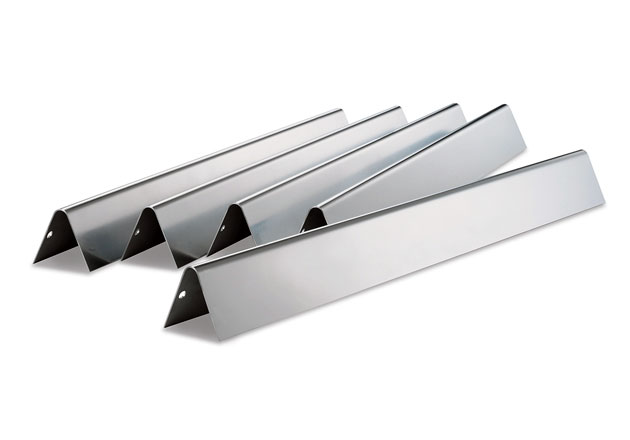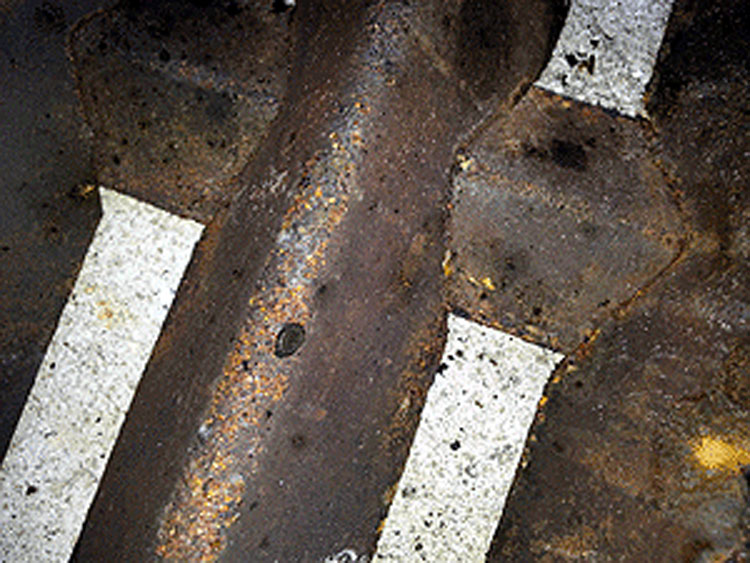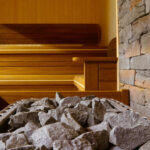Do Weber Gas Grills Need Lava Rocks? No, Weber gas grills do not need lava rocks; they use Flavorizer Bars instead. These bars effectively vaporize drippings, enhancing food flavor and minimizing flare-ups. Explore rockscapes.net for more innovative grilling solutions.
Rockscapes.net understands the importance of optimal grilling. Our comprehensive guides offer insights into grill maintenance and flavor enhancement, ensuring every barbecue is a success. For innovative grilling solutions and expert advice, check out our selection of landscape rocks and garden rocks.
1. What Are Lava Rocks and Why Were They Used in Grills?
Lava rocks were a common component in older gas grills, serving to distribute heat evenly and vaporize drippings. These rocks, typically made from volcanic rock, were placed above the burners to help prevent flare-ups and add a smoky flavor to food.
1.1 The Role of Lava Rocks in Heat Distribution
Lava rocks excel at retaining and distributing heat evenly across the grilling surface. This is crucial for achieving consistent cooking temperatures and preventing hot spots.
1.2 Lava Rocks and Flavor Enhancement
As drippings fall onto the hot lava rocks, they vaporize, infusing the food with a smoky flavor that many grill enthusiasts appreciate.
1.3 Drawbacks of Using Lava Rocks
Despite their benefits, lava rocks have several drawbacks:
- Maintenance: Lava rocks are porous and absorb grease and food particles, making them difficult to clean.
- Flare-Ups: Over time, the accumulated grease can cause significant flare-ups, posing a safety risk.
- Replacement: Lava rocks degrade and need replacement, adding to the overall cost of grilling.
- Uneven Heating: While they distribute heat, lava rocks can sometimes create uneven heating due to inconsistent placement or degradation.
2. What Are Weber Flavorizer Bars?
Weber Flavorizer Bars are angled metal plates designed to sit above the burners in Weber gas grills. They are engineered to protect the burners, vaporize drippings for added flavor, and minimize flare-ups.
2.1 How Flavorizer Bars Work
Flavorizer Bars work by:
- Protecting Burners: They shield the burners from direct drippings, preventing clogs and corrosion.
- Vaporizing Drippings: Drippings that fall onto the hot Flavorizer Bars are vaporized, creating smoke that flavors the food.
- Minimizing Flare-Ups: The angle of the bars directs grease away from the burners, reducing the likelihood of flare-ups.
2.2 Advantages of Flavorizer Bars Over Lava Rocks
Flavorizer Bars offer several advantages over lava rocks:
- Easier to Clean: Made of metal, Flavorizer Bars are easier to clean than porous lava rocks.
- More Durable: Flavorizer Bars are more durable and last longer than lava rocks, reducing the need for frequent replacements.
- Consistent Performance: They provide consistent performance and heat distribution, ensuring even cooking.
- Reduced Flare-Ups: Their design significantly reduces flare-ups, making grilling safer and more enjoyable.
2.3 Types of Flavorizer Bars
Weber offers Flavorizer Bars in various materials, including:
- Porcelain-Enameled Steel: These are durable and provide good heat retention.
- Stainless Steel: Stainless steel bars are corrosion-resistant and long-lasting.
- Cast Iron: Cast iron bars offer excellent heat retention and distribution.
3. Why Weber Gas Grills Use Flavorizer Bars Instead of Lava Rocks
Weber transitioned from lava rocks to Flavorizer Bars to improve the grilling experience. Flavorizer Bars provide better performance, durability, and safety compared to lava rocks.
3.1 Enhanced Flavor
Flavorizer Bars effectively vaporize drippings, infusing food with rich, smoky flavors, similar to what lava rocks offer, but without the mess.
3.2 Improved Safety
By minimizing flare-ups, Flavorizer Bars make grilling safer and more enjoyable. The reduced risk of uncontrolled flames is a significant advantage.
3.3 Durability and Longevity
Flavorizer Bars are designed to last longer than lava rocks, reducing the need for frequent replacements and saving you money.
3.4 Ease of Maintenance
Cleaning Flavorizer Bars is much easier than cleaning lava rocks. Their smooth surface allows for quick and efficient cleaning.
4. Maintaining Your Weber Flavorizer Bars
Proper maintenance of your Weber Flavorizer Bars is essential for optimal grilling performance and longevity.
4.1 Regular Cleaning
Clean your Flavorizer Bars regularly to remove grease and debris. This prevents flare-ups and ensures consistent performance.
4.2 Cleaning Tools
Use a grill brush or scraper to remove buildup. For tougher residue, soak the bars in soapy water and scrub with a non-abrasive pad.
4.3 Inspection and Replacement
Inspect your Flavorizer Bars regularly for signs of wear and tear, such as cracks or holes. Replace them when necessary to maintain optimal grilling performance.
4.4 Tips for Extending the Life of Your Flavorizer Bars
- Avoid Harsh Chemicals: Do not use harsh chemicals or abrasive cleaners that can damage the bars.
- Proper Storage: Store your grill in a dry place to prevent corrosion.
- Preheat the Grill: Preheat your grill before cooking to help burn off excess grease.
5. Understanding Weber Gas Grill Components
Familiarizing yourself with the components of your Weber gas grill will help you maintain it properly and ensure optimal performance.
5.1 Burners
The burners are the heart of your grill, providing the heat for cooking. Keep them clean and free of debris for consistent performance.
5.2 Cooking Grates
Cooking grates come in various materials, including porcelain-enameled cast iron and stainless steel. Clean them regularly to prevent food from sticking.
5.3 Grease Management System
Weber grills feature a grease management system that collects drippings in a disposable pan. Empty and replace the pan regularly to prevent grease buildup.
5.4 Ignition System
The ignition system lights the burners. Ensure it is functioning properly for easy and reliable start-up.
5.5 Lid and Thermometer
The lid helps retain heat, and the thermometer allows you to monitor the grill’s temperature. Keep both clean for accurate temperature readings.
6. Troubleshooting Common Weber Gas Grill Issues
Knowing how to troubleshoot common issues can save you time and money.
6.1 Uneven Heating
Uneven heating can be caused by clogged burners or unevenly distributed Flavorizer Bars. Clean the burners and ensure the bars are properly positioned.
6.2 Flare-Ups
Flare-ups are often caused by excess grease buildup. Clean the Flavorizer Bars and grease management system regularly to prevent them.
6.3 Low Flame
A low flame can be due to low gas pressure or a clogged regulator. Check the gas level in your tank and clean the regulator if necessary.
6.4 Ignition Problems
Ignition problems can be caused by a dead battery or a faulty igniter. Replace the battery or igniter as needed.
6.5 Rust and Corrosion
Rust and corrosion can occur on various parts of the grill. Clean and protect the grill with a grill cover to prevent rust.
7. Enhancing Your Grilling Experience with Accessories
Weber offers a variety of accessories to enhance your grilling experience.
7.1 Grill Brushes
A good grill brush is essential for cleaning the cooking grates and Flavorizer Bars.
7.2 Grill Covers
A grill cover protects your grill from the elements, extending its lifespan.
7.3 Rotisserie
A rotisserie allows you to cook evenly roasted meats and poultry.
7.4 Grill Baskets
Grill baskets are perfect for cooking vegetables and delicate foods.
7.5 Smoking Accessories
Smoking accessories, such as wood chips and smokers boxes, allow you to add smoky flavor to your food.
8. Exploring Rockscapes.net for Landscaping Inspiration
While Weber grills don’t need lava rocks, rockscapes.net offers a variety of natural stones perfect for enhancing your outdoor space.
8.1 Landscape Rocks
Landscape rocks can be used to create beautiful and functional outdoor features.
8.2 Garden Rocks
Garden rocks add texture and interest to your garden beds.
8.3 Types of Rocks Available
Rockscapes.net offers a wide selection of rocks, including granite, slate, and river rocks.
- Granite: Known for its durability and classic appearance.
- Slate: Offers a unique texture and color.
- River Rocks: Provide a natural and smooth aesthetic.
8.4 Using Rocks in Your Landscape Design
Incorporate rocks into your landscape design to create stunning focal points, pathways, and retaining walls.
 Weber Genesis gas grill with Flavorizer bars instead of lava rocks
Weber Genesis gas grill with Flavorizer bars instead of lava rocks
9. The Science Behind Flavorizer Bars
The effectiveness of Flavorizer Bars is rooted in scientific principles of heat transfer and vaporization.
9.1 Heat Transfer
Flavorizer Bars are designed to efficiently transfer heat from the burners to the food, ensuring even cooking.
9.2 Vaporization
When drippings fall on the hot bars, they quickly vaporize, creating smoke that infuses the food with flavor.
9.3 Material Science
The materials used in Flavorizer Bars are chosen for their heat resistance and durability.
9.4 Research and Development
Weber invests in research and development to continuously improve the design and performance of Flavorizer Bars.
According to research from Arizona State University’s School of Earth and Space Exploration, the effectiveness of heat distribution in grilling greatly depends on the material used. They found that metal bars (like Flavorizer Bars) distribute heat more evenly than porous rocks, leading to better cooking results.
10. Environmentally Friendly Grilling Practices
Embrace environmentally friendly grilling practices to reduce your impact on the planet.
10.1 Using Natural Gas
Natural gas is a cleaner burning fuel than propane, reducing emissions.
10.2 Proper Disposal of Grease
Properly dispose of grease to prevent water pollution.
10.3 Recycling Grill Components
Recycle grill components whenever possible to reduce waste.
10.4 Sustainable Landscaping
Create a sustainable landscape around your grill to reduce water consumption and support local ecosystems.
11. The Future of Grilling Technology
The future of grilling technology is focused on innovation and sustainability.
11.1 Smart Grills
Smart grills use technology to monitor temperature and cooking times, ensuring perfect results every time.
11.2 Solar Grills
Solar grills harness the power of the sun to cook food, reducing reliance on fossil fuels.
11.3 Electric Grills
Electric grills offer a convenient and environmentally friendly grilling option.
11.4 Biogas Grills
Biogas grills use renewable biogas as fuel, reducing greenhouse gas emissions.
12. Grilling Safety Tips
Always follow safety guidelines when grilling to prevent accidents.
12.1 Grill Placement
Place your grill on a stable, level surface away from flammable materials.
12.2 Supervision
Never leave a lit grill unattended.
12.3 Fire Safety
Keep a fire extinguisher nearby in case of emergencies.
12.4 Proper Ventilation
Ensure proper ventilation when grilling indoors or in enclosed spaces.
12.5 Protective Gear
Use protective gear, such as gloves and aprons, to prevent burns.
13. Delicious Grilling Recipes
Explore a variety of delicious grilling recipes to impress your family and friends.
13.1 Grilled Steak
Grill a juicy steak to perfection with these tips.
13.2 Grilled Chicken
Marinate chicken for a flavorful and healthy grilling option.
13.3 Grilled Vegetables
Grill vegetables for a delicious and nutritious side dish.
13.4 Grilled Seafood
Grill seafood for a light and flavorful meal.
13.5 Grilled Pizza
Grill pizza for a crispy and unique culinary experience.
14. Maintaining Your Outdoor Cooking Area
Keep your outdoor cooking area clean and organized for a pleasant grilling experience.
14.1 Cleaning Surfaces
Clean countertops and surfaces regularly to prevent foodborne illnesses.
14.2 Organizing Tools
Organize grilling tools for easy access.
14.3 Proper Storage
Store grilling equipment properly to protect it from the elements.
14.4 Landscaping Maintenance
Maintain the landscaping around your outdoor cooking area to create a welcoming environment.
15. Community and Resources for Grilling Enthusiasts
Connect with other grilling enthusiasts and access valuable resources.
15.1 Online Forums
Join online forums to share tips and recipes.
15.2 Grilling Clubs
Participate in grilling clubs for social gatherings and competitions.
15.3 Local Events
Attend local grilling events to learn new techniques.
15.4 Expert Advice
Seek expert advice from grilling professionals.
 Rusty Flavorizer bars needing maintenance
Rusty Flavorizer bars needing maintenance
16. Weber Grill History and Innovation
Weber has a rich history of innovation in grilling technology.
16.1 The Kettle Grill
Weber revolutionized grilling with the invention of the kettle grill.
16.2 Gas Grill Innovation
Weber continues to innovate with its line of gas grills, including the use of Flavorizer Bars.
16.3 Commitment to Quality
Weber is committed to providing high-quality grilling products.
16.4 Customer Satisfaction
Weber prioritizes customer satisfaction with its products and services.
17. Comparison of Grilling Methods
Compare different grilling methods to find the best option for your needs.
17.1 Gas Grilling
Gas grilling offers convenience and precise temperature control.
17.2 Charcoal Grilling
Charcoal grilling provides a smoky flavor and traditional grilling experience.
17.3 Electric Grilling
Electric grilling is a convenient and environmentally friendly option.
17.4 Pellet Grilling
Pellet grilling combines the convenience of gas grilling with the smoky flavor of charcoal grilling.
18. Grilling in Different Climates
Adjust your grilling techniques for different climates.
18.1 Hot Weather Grilling
Grill in the shade during hot weather to prevent overheating.
18.2 Cold Weather Grilling
Use extra fuel and preheat the grill longer in cold weather.
18.3 Windy Conditions
Protect the grill from wind to maintain consistent temperature.
18.4 Humid Climates
Adjust cooking times in humid climates to prevent food from becoming soggy.
19. Incorporating Stone into Your Outdoor Kitchen
Stone can add beauty and functionality to your outdoor kitchen.
19.1 Stone Countertops
Stone countertops are durable and provide a natural aesthetic.
19.2 Stone Backsplashes
Stone backsplashes protect walls from splatters and add visual interest.
19.3 Stone Fire Pits
Stone fire pits create a cozy and inviting outdoor space.
19.4 Stone Pathways
Stone pathways provide a durable and attractive walkway.
20. Frequently Asked Questions (FAQs) About Weber Gas Grills and Lava Rocks
Here are some frequently asked questions about Weber gas grills and lava rocks.
20.1. Can I Use Lava Rocks in My Weber Gas Grill?
No, Weber gas grills are designed to be used with Flavorizer Bars, not lava rocks. Using lava rocks can damage the grill and void the warranty.
20.2. What Are Flavorizer Bars Made Of?
Flavorizer Bars are typically made of porcelain-enameled steel, stainless steel, or cast iron.
20.3. How Often Should I Replace My Flavorizer Bars?
Replace your Flavorizer Bars when they show signs of significant wear and tear, such as cracks or holes.
20.4. How Do I Clean Flavorizer Bars?
Clean Flavorizer Bars with a grill brush or scraper. For tougher residue, soak them in soapy water and scrub with a non-abrasive pad.
20.5. Are Flavorizer Bars Better Than Lava Rocks?
Yes, Flavorizer Bars are better than lava rocks because they are easier to clean, more durable, and provide consistent performance.
20.6. Where Can I Buy Replacement Flavorizer Bars?
You can purchase replacement Flavorizer Bars from Weber dealers or online retailers.
20.7. Do Flavorizer Bars Add Flavor to Food?
Yes, Flavorizer Bars vaporize drippings, creating smoke that infuses food with flavor.
20.8. Can I Use Aftermarket Flavorizer Bars?
It’s recommended to use genuine Weber Flavorizer Bars to ensure proper fit and performance.
20.9. What If My Weber Grill Is Old and Originally Used Lava Rocks?
Even if your Weber grill is old and originally used lava rocks, it’s still best to switch to Flavorizer Bars if possible, as they offer superior performance and safety.
20.10. How Do I Know If My Flavorizer Bars Need Replacing?
Check for signs of rust, cracks, or significant warping. If the bars are severely damaged, it’s time to replace them.
Conclusion: Embrace Modern Grilling with Weber and Rockscapes.net
Weber gas grills offer a superior grilling experience with Flavorizer Bars, providing enhanced flavor, safety, and durability compared to older lava rock systems. By understanding the components and maintenance of your Weber grill, you can enjoy countless delicious meals. And while you’re upgrading your outdoor cooking setup, don’t forget to explore rockscapes.net for landscaping inspiration to create the perfect backyard oasis.
Ready to transform your outdoor space? Visit rockscapes.net today for design ideas, rock selections, and expert advice to elevate your landscaping projects. Let us help you create a stunning outdoor environment that complements your grilling experience! Visit our location at 1151 S Forest Ave, Tempe, AZ 85281, United States, or call us at +1 (480) 965-9011. Explore the beauty of stone and elevate your outdoor living today.


